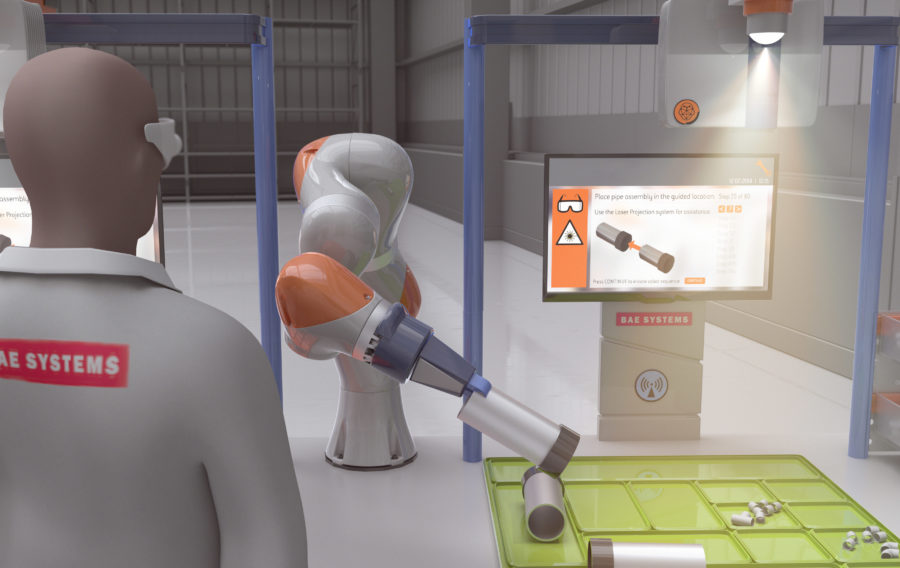
At the cutting edge of industry, aerospace manufacturing is no stranger to innovation. The arrival of Industry 4.0, otherwise known as the fourth industrial revolution or the Industrial Internet of Things, pushes the advancement of digital manufacturing across the supply chain.
Companies within the aerospace sector, like those in any other industry, need to remain competitive as they look to do business across the globe. Industry 4.0 gives them the platform to improve their manufacturing process by providing the tools to reduce costs and waste, and to enable improvements in both quality and design.
It is envisaged that implementation of technologies such as additive manufacturing, automation, collaborative working processes and data sharing will lead to the creation of smart industry and stimulate the British economy to the tune of £455 billion.
Although the potential for economic savings is clear, Industry 4.0’s impact upon business models has a far greater reach.
Like the digitisation of other industries, the new technology will see a more collaborative approach, with increased connectivity and data sharing not just across design and manufacturing phases of defence projects but also in the maintenance process.
Real-time updates could see an end to unscheduled asset maintenance and repair as automated information enables the adoption of predictive maintenance programmes.
With talk of automated processes, inevitably there will be the fear that Industry 4.0 will replace people at the heart of the manufacturing process.
This would appear to be unfounded, as the new technology will instead be used to augment the skills of people and take them away from potentially hazardous, strenuous or repetitive processes.
BAE Systems is involved in the manufacturing and development of some of the world’s most advanced combat aircraft, including the Eurofighter Typhoon and F-35 Lightning II and has revealed that its manufacturing strategy will see the company continually invest in and enhance its capabilities to deliver the aircraft of the future.
The company opened its New Product and Process Development Centre last year, where 3D printing and virtual reality technology are used to reduce costs and speed up manufacturing processes for combat aircraft.
BAE Systems has also invested in robotics as part of the early careers training programme at its state-of-the-art Academy for Skills & Knowledge at its Samlesbury site in Lancashire.
Engineers will soon benefit from collaborative robots – or ‘cobots’ – designed to support people with complex manufacturing of combat aircraft by the end of 2018.
The cobotic workstation, a key feature of the factory of the future, is fitted with a range of digital technology and will be piloted at the company’s site in Warton, Lancashire to work safely and seamlessly alongside manufacturers building high-tech systems for cutting-edge combat aircraft.
The cobotic workstation is part of BAE Systems’ plans to further incorporate and integrate manufacturing technologies into the workplace – such as reconfigurable, multifunction technology, 3D printing, augmented reality and manufacturing autonomy.
The technologies that have been developed – including operator recognition and a sensor-enabled cobotic arm – will be tested on the Typhoon production line by the end of this year.
The introduction of new digitally integrated advanced manufacturing technologies builds on existing investments in robotics and aims to drive further productivity, quality and safety improvements into future combat aircraft programmes, helping to increase the company’s competitiveness and manufacturing agility.
Robotics is already an integral part of BAE Systems’ combat aircraft production line which includes a high level of automation, but the integrated sensors that feature in the workstation make this the next step in people safely working directly with robots.
BAE Systems has collaborated with a number of partners including the University of Sheffield’s Advanced Manufacturing Research Centre, and Siemens, which will provide software that will connect technologies through the workstation and output manufacturing data to help engineers analyse and improve the advanced manufacturing processes.
Dave Holmes, Manufacturing Director at BAE Systems’ Air business, said: “We’ve only really started to scratch the surface of what automation can do in industry and some really exciting possibilities are emerging as we enter the fourth industrial revolution.
“Cobotics is the next, natural step in developing manufacturing technology that will allow for a blending of skilled roles. We envisage that people will make larger, more strategic decisions while delegating the repetitive and intricate aspects of production to a robot.”
”Through the factory of the future technology, automation will empower employees to work safely at greater speed and with maintained accuracy, leading to increased productivity and quality.”
If you would like to join our community and read more articles like this then please click here.







